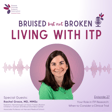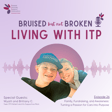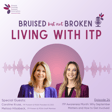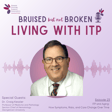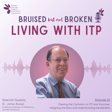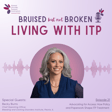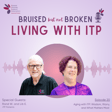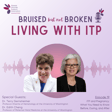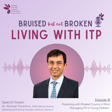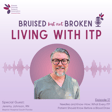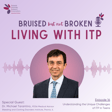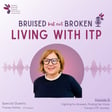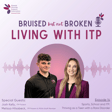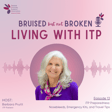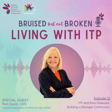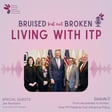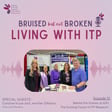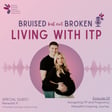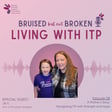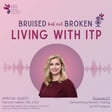Diagnosis and Early Experience with ITP
00:00:00
Speaker
but I was diagnosed back when I was 12 years old. and ended up finding out after I had a simple dental extraction before getting my braces put on ah that ended up leading to multiple days of unexplained bleeding, waking up with blood, covering my face and my pillow every morning.
00:00:16
Speaker
It's been almost 10 years since I started my medical training. you know I still regularly remind myself of what i felt when I was first diagnosed or you know even just day-to-day.
00:00:27
Speaker
And I think a big part of that was also attending the PDSA conference, getting to see other patients and kind of changing my outlook on my diagnosis to be a bit more positive and how I could sort of advocate for myself, but also for other patients and getting involved with PDSA.
Introducing the Podcast and Guest Speaker
00:00:43
Speaker
Welcome to the PDSA podcast, Bruised But Not Broken, Living with ITP. The diagnosis of a bleeding disorder like immune thrombocytopenia may leave you wondering, how can I really live my life with ITP?
00:00:57
Speaker
PDSA's podcast, Bruised But Not Broken, Living with ITP, brings empowering stories, the latest research and treatment updates, lifestyle tips, and answers to the real-life questions the ITP community is asking.
00:01:12
Speaker
Here's your host for this episode, Barbara Pruitt.
00:01:22
Speaker
Hello, today have a very special guest. We have Dr. Kristen Hunt, who is a pediatric immunologist. She is from Canada. She has a Bachelor of Science in Microbiology and Immunology and a Master of Science in Immunology from McGill University.
00:01:42
Speaker
She obtained her medical degree at McGill, and during that time, she co-founded McGill's first rare disease interest group. Now, Kristen completed her pediatric residency at Queen's University in Kingston, Ontario.
Dr. Hunt's Teenage Challenges and Stabilization with ITP
00:01:59
Speaker
Then she completed her final subspecialty training in pediatric allergy and clinical immunology at the Hospital for Sick Children in Toronto, Canada.
00:02:10
Speaker
Kristen, thank you so much for joining us today. Yeah, thanks so much for having me, Barbara. I'm happy to be here. I'm happy to have you here too, because you're history, your personal history is so important two this podcast because you were diagnosed actually with ITP when you were 12 years old.
00:02:31
Speaker
And I know i met you at one of the PDSA conferences years ago when you were still, I don't know, a teenager. How old were you when you came to your first conference?
00:02:41
Speaker
Yeah, it feels like forever ago. it was about when I was 19 at the time. Okay. Okay, gosh. And now you are a grown woman, you're a doctor, you're married. I mean, this has been wonderful, I have to say, for me to see and to to follow you through through your life like this. This is terrific. So um what can you share with us about your ITP journey?
00:03:08
Speaker
Yeah. So as you mentioned, i was diagnosed back when I was 12 years old. um i ended up finding out after I had a simple dental extraction before getting my braces put on ah that ended up leading to multiple days of unexplained bleeding, waking up with blood, covering my face and my pillow every morning, ah which certainly wasn't what was thought to be normal.
00:03:29
Speaker
And so my dentist suggested I get a CBC done So that's when I found out my platelet count was actually quite low at the time. And so back then I was living in Montreal. So I went to the children's hospital there to get a lot of different tests done, make sure that there was nothing else going on. And then ultimately I was diagnosed with ITP.
Involvement with PDSA and Impact on Career
00:03:46
Speaker
So for me, I found like the first four years after my diagnosis was quite the rollercoaster ride. I was kind of doing prednisone and monthly IVIG with my platelets kind of responding well temporarily and then continue to kind of come down with that classic kind of rollercoaster ride, weekly blood work, and then all the side effects that come with steroids and so forth.
00:04:06
Speaker
So those were probably the hardest years, especially because I just started high school. I was a teenager trying to find out who I was in this world. And um you know I think that was probably the hardest couple of years after my diagnosis.
00:04:18
Speaker
But then towards sort of the fourth or fifth year, when I was getting towards the end of high school, we kind of decided that Maybe let's see what happens if I stop treating for a little while and see where my platelet counts kind of stabilize. So I ended up doing that.
00:04:30
Speaker
I was very lucky because I've never been a hugely symptomatic patient. So unless, of course, I'm provoked with dental work, but ah usually I'm not a big bleeder. So my platelets without treatment actually stabilize kind of between 20 and 30,000 range. And for me, that was very safe.
00:04:44
Speaker
It kind of allowed me to do most of the things I wanted to do in my life. Of course, living a generally risk-free lifestyle and making some of those adaptations. But I felt that that was sort of the best move for me, especially while kind of waiting for other treatment options to maybe become available.
00:04:58
Speaker
I think when moved towards that and started to kind of learn more about my diagnosis and take on more of a an advocacy role for myself and not just kind of rely on my parents to make those decisions. And, you know, again, growing into becoming an adult um after all this time living with it.
00:05:13
Speaker
um I think that really kind of helped shape where I went next with my with my health and and try to take back control of that. Well, and that's a difficult time for a teenager growing into adulthood to claim that responsibility for your health without your parents' input or asking for their advice, because that that is a serious transition for for someone with ITP.
00:05:37
Speaker
Yeah, absolutely. Like we said, you you came to your first conference when you were 19. And I know you've been involved with the PDSA. Share some of that with us.
00:05:49
Speaker
Yeah, it's interesting because for the first sort of four, those first four to five years, which were probably the hardest years, I actually had never met another ITP patient before. I didn't really know much about PDSA yet at that time.
00:06:00
Speaker
It was actually thanks to my pediatric hematologist that I was seeing in Montreal who had some connection and knew about PDSA and she had brought it up a couple of times. And then it wasn't until later on where we started really searching online. My mom was doing a lot of her own research.
00:06:14
Speaker
um that we kind of looked and found more about what PDSA was doing. And then interestingly, that kind
Founding PDSA Kids Club and Specializing in Immunology
00:06:19
Speaker
of coincided where i when I was sort of graduating from high school, starting my college program. And I kind of had to do like this community organization project. And I was like thinking about ideas of what I wanted to do. And then i saw that PDSA, i think that might have been the first year that they were doing the ITP walk run, like the Pump It Up for Platelets event.
00:06:37
Speaker
was like, oh, I think I really want to you know host one with my college. And I was on the cross-country team for for running. So that was kind of like the perfect combination of you know my interests. And so that was back when I was 18. I contacted PDSA for the first time to see how I could get involved.
00:06:53
Speaker
And so that was back in the fall of, I think, 2010, which seems so long ago. And then it was not long after that, I think in the summer, that following summer where I attended my first conference and then really got exposed to what PDSA was all about. And then, of course, met, you know, IHP patients other than myself for the first time since I'd been diagnosed. So that was, you know, really life changing for me.
00:07:15
Speaker
Right. And I know that you helped start the the Kids Club. Yeah. For our annual conference, you and Melissa. Hilsebeck started the Kids Club and actually ran it for a few years, didn't you?
00:07:28
Speaker
Yeah, I think we ran it for almost the first five years um until maybe we grew out of it ourselves a little bit and handed it off to some other keen people who wanted to take over. But it was such a great experience to start that. And I think the motivation around the kids camp for Melissa and I, that we were both kind of diagnosed at that sort of teenagehood years and felt that, you know, looking around the conference, we felt that the younger kids and some of the teenagers needed a place of their own to kind of connect.
00:07:56
Speaker
and chat and make those connections that could be turning into long lifelong friendships like Melissa and I have, which we're so grateful for. So that was kind of the inspiration for starting the kids camp.
00:08:07
Speaker
It was so much fun every year running that camp until again, we we handed it off eventually, but we're so happy that it continues to be an integral part of the conference every year. Oh, it certainly is. And I think for the children attending, it's so important for them to meet another child with ITP, because like you said,
00:08:25
Speaker
you know, it was five years before you met anyone. And, you know, that's kind of a very isolating feeling as an ITP patient when you don't know anyone else with it. Exactly.
00:08:36
Speaker
need to be able to communicate and and have a friend that knows what you're going through exactly. but sure. What led you to becoming a doctor? How did how did that happen?
00:08:49
Speaker
Yeah, it's interesting. For the first couple of years after I was diagnosed, you know becoming a doctor was never on my radar. And initially, after I got ITP, I like was a very angsty kind of teenager. I hated going to the hospital. I hated anything medical related. Even growing up, I was a very kind of artsy kid.
00:09:06
Speaker
um So it was a very big change for me to kind of decide to pursue like science and medicine, very head head on. And again, I think that came more towards um the end of high school, early college days, where my interests were starting to um change a little bit. And I think a big part of that was also attending the PDSA conference, getting to see other patients and kind of changing my outlook on my diagnosis to be a bit more positive and how I could sort of advocate for myself, but also for other patients and getting involved with PDSA.
00:09:37
Speaker
But then also, you know, the interest that I gained through just wanting to learn more about how my immune system worked. and And so I ended up deciding to pursue my university studies early in the early days, um ah in immunology. And I have to give a small shout out to Dr. John Semple, who would give his sort of classic military immunology talk at the annual conference. And when I saw that first talk, I think I just started my first year of undergrad in in immunology. And he kind of further, you know, solidified my interest in wanting to pursue that particular field.
00:10:08
Speaker
um And then once I kind of started to learn more, then I just really loved the the field of immunology and and understanding, you know, how rapidly it was changing and how much more we were understanding about the immune system and how that related to ITP was was very interesting to me.
00:10:22
Speaker
Well, it sounds like you got in on on the ground level because like you said, immunology is like a science that is like exploding now. And 10 years ago, there was not as much known at all. So um that's great that you're getting in at this point.
00:10:40
Speaker
and And what is it that made you decide to go into pediatric immunology? I think just from the early days with the kids camp, I've always known that I really liked working with children. And i think I just always felt a sort of different connection with them because like pediatric patients in general, because I had kind of gone through a similar experience myself and growing up with a chronic illness is a very kind of unique perspective to have.
00:11:05
Speaker
um So I really, really liked working with children. And then I developed this love for immunology. And then it kind of worked out perfectly that, you know, the patient population that tends to have the most immune deficiencies or what we now call inborn areas of immunity really ends up being the pediatric population. And that's where these conditions are diagnosed.
00:11:21
Speaker
And because, you know, technology and things are improving, these patients are also living, you know, much longer, better quality of lives, and well into adulthood. And so, you know, now it's not just for pediatrics, but also on the adult side, we're seeing a lot more of these immune system conditions and understanding how I can kind of help them and diagnose them. And the new treatments that are coming up is, it's been really rewarding to kind of be part of that new era of medicine, I guess.
Empathy in Medical Practice through Personal Experience
00:11:47
Speaker
that's That's terrific. And I would think that, like you said, growing up with an immune disorder like ITP, it would influence the way that you approach your patients.
00:12:00
Speaker
I mean, don't you think that has a big influence on you? Yeah, absolutely. i think when I very first started medical school, it was very strange experience initially for me to be on the other side of that medical interaction because I was so used to being initially the patient.
00:12:15
Speaker
And then suddenly I found myself on the physician side and it was a very different kind of perspective to have. And now that it's been almost 10 years since I started my medical training, you know I still regularly remind myself of what I felt when I was first diagnosed or you know even just day-to-day being anxious around new test results and things like that.
00:12:36
Speaker
um And I think keeping that um perspective at the forefront allows me to be a lot more present with my patients, allow for moments of silence and digest digesting knowledge and new information and making space for questions and discussion.
00:12:50
Speaker
And I think it's also really impacted my focus on getting to know my patients on a human level and sort of understanding what's important to them, what are their goals and values in life? How does their disease impact their ability to do that?
00:13:02
Speaker
And then what are there going to be their health goals going forward when we decide on treatment options and so forth? So I think all of those perspectives have definitely been, you know, a little bit more brought to the forefront for me because of my personal experiences. And so I regularly try to remind myself of that um on a daily basis.
00:13:21
Speaker
I think that's wonderful. I think, yeah, I want you to be my doctor. you know You're going to spend the time with me. You're going to give me some silence. You're going to let me digest things. You're going to ask questions. I i think that's key for most doctors need need to be that type of an individual.
00:13:38
Speaker
ah but And I'm sure your patients really appreciate that. Do you share with them that you have ITP or that you have an immune disorder? um Is that something you want to do or is that something you avoid?
00:13:51
Speaker
It kind of depends on the patient interaction. One thing that I do recognize is that when I'm with a patient, I want that encounter to be all about them and not about me. So if I feel like maybe it could and it could add to the patient's perspective or feeling of the situation, then I might sometimes offer that information Especially if I'm trying to counsel around maybe support services or things like that, if I wanted to tell them why I think PDSA, let's say, is so important and great for patients. But, um you know, I think it just depends on the on the interaction and how I think if it's going to be beneficial for the patient or not. But I do try to keep the encounter focused on the patient, um but then also using my experience to provide that, you know, empathy and and that awareness, but then sort of using the the judgment depending on the situation.
Approach to Treating Complex ITP Cases
00:14:39
Speaker
I think that's terrific the way you approach it because I think that some patients need to know that their physician has a good understanding of what they're going through. Because a lot of times I think patients feel like a disconnect, like the doctor's just treating me by this is what he read, this is what he knows or she knows, and forgetting about that personal um influence on it. So that that probably means a lot to them when you are able to share it.
00:15:08
Speaker
Now you have ITP, but now you are a pediatric immunologist. So the type of patients that you see would be probably what the difficult ITP patients or when a an ITP patient, when they think it's something different, like the difference between what we talk about primary ITP and secondary ITP. Could you kind of explain that for audience Yeah, for sure. So exactly. i tend to see the patients who are more complex with their ITP, meaning that they don't just have ITP or their hematologist or their pediatrician um is wondering if there's something else going on that could further explain why they have maybe ITP, but a bunch of other clinical manifestations or symptoms that don't quite fit with just the ITP.
00:15:58
Speaker
And in immunology, we're really looking for, does this patient have a potential inborn error of immunity? um or maybe like a specific gene that's causing a disruption in their immune system that put them at risk for having ITP, but maybe at risk for other autoimmune conditions or other types of infections and things like that.
00:16:15
Speaker
um So to answer the question about you know primary versus secondary ITP, you know primary ITP is really a diagnosis of exclusion. And that's typically made by a hematologist.
00:16:26
Speaker
um So more often than not, you hear all of our stories where we get some, for some reason, we got a CBC and our platelet count is found to be low. um But we have to keep in mind that you know there's a lot of different causes for a low platelet count.
00:16:38
Speaker
ah That could be anything ranging from ongoing active infection to a side effect of a medication to an underlying broader diagnosis, which is what I'm kind of usually looking for.
00:16:49
Speaker
But you know if the hematologist has done their their history, their exam, all their testing, and everything comes seems to come back normal, and the only thing that's abnormal is that low platelet count with no other red flags, then usually the diagnosis becomes primary ITP and is treated as such.
00:17:04
Speaker
And oftentimes, even the patients that I see, you know that's how things started out. um But then if you know something else starts to evolve or change with time, where maybe this patient now starts to have these recurrent severe infections or is getting more than one autoimmune condition, though there's an interesting family history of some of these things, then the kind of red flags start to go off um where we start to think about, could this ITP be part of something bigger?
00:17:28
Speaker
And that's where we start to look for, you know, is there a single gene mutation that's at play here or something else going on? And so that's kind of what we end up talking about. Secondary ITP is that the ITP comes as part of something else.
00:17:41
Speaker
And again, could still be that inborn area immunity or something far more more common, like a medication side effect or um or a chronic infection. um But, you know, a lot of this ends up being, you know, a multidisciplinary approach where sometimes different specialists and doctors have to talk to each other and figure out, you know, what what are the best tests we should be doing for this patient and what do we think is going on and try to work with them to sort it out.
00:18:05
Speaker
That's one of the reasons why your hematologist, when you first see a hematologist and you're diagnosed with ITP, why the family history is so important. um Because that can lead to some cues as far as, is this an inherited type of ITP?
00:18:22
Speaker
um Or is there more going on if there were other family members with other immune disorders and and things? So You know, it's really important when when you think about your family history.
00:18:35
Speaker
um i think a lot of people think just about themselves and maybe the parents, but it goes further than that goes into the grandparents, aunts and uncles, what diseases or disorders did people pass away from maybe.
00:18:48
Speaker
And um that's important for everyone to know and keep in mind. So goodbye. observation that you were saying about that. Now, i I know one test that ITP patients do not like to have is the bone marrow biopsy.
00:19:06
Speaker
And for regular, i'm I'm going to call it regular ITP, I guess it's primary ITP, it's usually not and indicated. But in if a patient comes to each see you, is that something that you do regularly?
00:19:18
Speaker
I wouldn't say it's something we do regularly. i think it's still in the realm of the hematologist to decide around the bone marrow biopsy. And, you know, I think their scope of diagnosis that they're going to be considering are going to be things like leukemias or bone marrow failures.
00:19:33
Speaker
um And those things would be helpful to have the bone marrow biopsy. Usually by the time they get to immunology, um if something was worrisome in that realm, usually they'll have come with those results already. um Or we will if we think that there is ah you know worthwhile need to kind of do a bone marrow biopsy, then we will talk with our hematology colleagues and discuss that with them.
00:19:55
Speaker
Just because, again, they're the ones who are going to be performing and interpreting the test. So um if it hasn't already been done and we think it could be helpful, then we would kind of relay that back. But I'd say the tests, some of the tests that we do are are more focused on sort of the immune function and genetic testing.
00:20:11
Speaker
Okay, that's, I was going to ask, do you do a lot of genetic testing that would lead you to ah diagnosis then? Yeah, we we definitely do a lot of genetic testing, but I will say that the genetic testing, although it's come a long way, is not perfect.
00:20:26
Speaker
And so we usually try to lead up to that with gaining as much clinical information to sort of improve what we call our pretest probability. What's the likelihood of finding something that's relevant on that genetic testing?
00:20:40
Speaker
And so the things that are really helpful, like in our and our initial encounter with a patient will be, you know, the detailed history, as we talked about, are those red flags, the family history, any physical exam findings that could be relevant. to And then usually we have sort of some baseline a immune function testing where we look at the numbers of immune cells and how they work.
00:21:00
Speaker
And with those are kind of simple blood tests that we can do. And sometimes we get a lot of information just from that initial workup. And then if we think that this is pointing towards a specific condition, then we'll be more likely to send the genetic testing because now we have a much higher probability that, you know, we've picked up enough things already that we think we we might find something.
00:21:21
Speaker
Versus, of course, there are other immune sort of dysregulation disorders that we call where sometimes the main issue is around like the autoimmune piece and not the infection piece. And so sometimes all the immune tests we do in the blood work can actually come back completely normal.
00:21:35
Speaker
But if we still have that clinical suspicion that something's not going right still, then we'll still send the genetic testing because i I will say there are some conditions that can only be diagnosed from genetics.
00:21:45
Speaker
because all the other tests usually come back normal.
Role of Genetic Testing in ITP Diagnosis
00:21:48
Speaker
So it is a bit of a detective work, I will say. We do a lot of, you know, lots of question answering, lots of digging into the past history to see if we can find old test results, old, um you know, notes about what happened around infections and things like that to really help guide us.
00:22:03
Speaker
um But then, you know, if you do get a genetic testing result back that's positive, that can be really helpful um for further deciding where to go next with that patient and what maybe treatment options that they would benefit from.
00:22:15
Speaker
Well, the diagnosis of something very unusual, like what you're looking for, really takes a kind of inquisitive mind, you know, like yours to delve into that. When a patient is diagnosed with primary ITP and they come to you and end up finding out that maybe it is something more than that.
00:22:36
Speaker
How do you go about trying to ease them into realizing this is something a bit different? I mean, it sounds like you've got to really have some counseling and discussion about that because it's probably, I would think that what you're looking at is actually more difficult to treat than primary ITP. Is that correct? Yeah.
00:22:54
Speaker
Yeah, generally so. i would say and we're getting luckier now that with better genetic testing and understanding at some of the the molecular level, we have all these new medications coming out called like biologic medications where we can specifically target like one protein and a pathway that affects the immune system. And that could be so helpful for the patient.
00:23:14
Speaker
But a lot of genes that we are gene mutations that cause disease in immunology don't often have a curative treatment either. And so sometimes it's more supportive and we kind of use other established treatments to kind of, you know, help that patient along the way. But yeah, I think in terms of the counseling, it's it's an interesting approach. I think a lot of patients who come see us um have probably already gone through a lot of testing, seen a lot of specialists, or there's been something on you know on the radar that maybe there is something else already going on that's just not just ITP.
00:23:46
Speaker
So I do find that kind of helps if the patient already feels like I'm still looking for answers. I still don't know if this is just ITP or what's going on. And so that can kind of help to navigate that discussion where we can kind of say, especially if we do find something that's clinically relevant, it can be really helpful to to so sort of turn it in into bit of a positive light, I guess, where you now have a better answer as to what's going on.
00:24:10
Speaker
And i I do feel that once you kind of have the underlying mechanism or answer and in some of these cases, then that can really help, but um you know, pave the path forward as to, the you know, helping the patient understand what is the prognosis? What can they expect? What are things we need to monitor for going forward?
00:24:27
Speaker
And are there different treatment options now available ah that maybe we wouldn't have thought of if this was just going to be primary ITP? So I think paving it in the in a more positive light that having this extra information,
00:24:38
Speaker
And on fully understanding the broadness of their condition can really have a positive impact on their clinical outcomes and perhaps, you know, provide the patient with some relief to know that, okay, I have an answer that's different than I initially thought, but hopefully now we can kind of move forward with that information in the right direction.
00:24:57
Speaker
Now, I know as a patient, we are always looking for answers. we're We're always having our mind what causes what, you know, and you kind of have to settle into when it's primary ITP, that this is what it is, that we're going to move forward.
00:25:13
Speaker
Are there certain things that as a patient we should be looking for that might lead us in the direction of maybe this is something more than that? Or would a parent of a child think, you know, hey, what what are some red flags that a patient or a parent of a patient should be kind of looking for?
00:25:36
Speaker
Yeah, that's a great question. And I think it'll be a collaborative effect between the patient, the family, and the primary physician who's following them, whether that's a family doctor, a pediatrician, or even ah primary hematologist, to kind of be aware of some of those red flags as to when it might be you know helpful to do referral to immunology.
00:25:54
Speaker
um So one of the big ones that's probably more common is like these severe recurrent infections. And you know I think it's important to distinguish between you know a lot of young kids can have up to 10 or 12 viral infections a year, especially if they're going to school and daycare, and that can be very normal.
00:26:10
Speaker
And the other thing is that um ITP patients are often on immunosuppressant medications to treat their ITP. So sometimes At baseline, they can be at risk for more frequent infections because they're on a medication that does that.
00:26:22
Speaker
But outside of that, we're kind of looking more for those severe infections that are more likely to be bacterial, that required like a lot of antibiotics or even IV antibiotics, a prolonged admission to the hospital, um or certain types of infections that we call more like opportunistic infections.
00:26:39
Speaker
So these are infections that normally only happen in people whose immune systems don't work properly. So things like fungal infections that could be in the lungs, abscesses in the skin or organs.
00:26:50
Speaker
There's lots of interesting, weird infections. And so, um you know, if ever you're in that scenario where your your child is perhaps admitted for something like this and people are saying, oh, this is a weird bug or this is a weird type of infection, especially if it's happened more than once.
00:27:05
Speaker
That's where some of the the red flags start to go off for us in immunology. On top of that, then we want to think about, you know, ITP is an autoimmune condition, but does this patient have, you know, more than one autoimmune condition? So do they have three or four maybe have been diagnosed over a couple of years?
00:27:19
Speaker
That would be a bit of a more red flag for a immune dysregulation, that there's something going in the immune system where it keeps recognizing itself as foreign. And it's not just attacking platelets, it's attacking other organs too.
00:27:31
Speaker
The other thing that's sort of been under the radar for a while that's becoming a bit more obvious now is just symptoms of like really what we call severe ATP. And that means like things like allergies, asthma, eczema, and especially eczema in children. That's very, very severe. um That's like us an inflammatory skin condition.
00:27:51
Speaker
and where you kind of get this disrupted skin barrier and then you're more likely to have sometimes some infections with the skin, but also it's very itchy and very uncomfortable. In and of itself, you know, something like eczema can be very common in the pediatric population.
00:28:04
Speaker
But if it's very, very severe and refractory to treatment and it's coming with ITP and all these other things, then you start to have to think about, again, is this something a little bit more? One classic example actually with that is something called Wiesbott-Aldred syndrome.
00:28:19
Speaker
That's actually an X-linked condition, meaning it only affects boys. But interesting, this condition comes with usually severe eczema, so like that skin rash. um recurrent infections, and then also thrombocytopenia is actually a key feature of it.
00:28:32
Speaker
But the interesting thing about that thrombocytopenia, the platelets are not just low, they're also very small. And that's something we can see on the blood smear. And so there's all these like little sort of um pieces to the puzzle that we kind of have to sift through.
00:28:45
Speaker
um and then I guess the final red flag would also be around and certain types of cancers that might get diagnosed early in in life or early in childhood and adolescence, like leukemias and lymphomas, or again, a strong family history of that would be kind of another component. But again, in conjunction with some of these other features,
00:29:05
Speaker
So those are the the big red flags that I would sort of usually be screening for. We mentioned a little bit about family history already. But again, as you said, Barbara, the first um degree family members, so basically the parents and the siblings are still the most important.
00:29:19
Speaker
But it is kind of helpful to know in sort of the higher up generations if there was, again, any early... life deaths that weren't explained? Or is there a history of recurrent and severe infections?
00:29:30
Speaker
Maybe there's already a diagnosis in the family that's um well known. And then we need to start thinking about that in the in the current patient. so um So the family history is definitely very, very important.
Support Organizations for Immune Disorders
00:29:40
Speaker
But yeah, these are all the kind of the the key red flags that I'm usually screening for on history to figure out, you know, what's the likelihood that there's something else going on here. Well, that's very interesting because those those should definitely be things that you would be able to notice um if your child was going through that or as an adult, if you were having some of these recurrent infections. and And an interesting point you made, a lot of patients with ITP are on immune suppressants. So just by being on an immune suppressant makes you more susceptible to some infections. So that needs to be looked at from a different aspect if something else is going on too.
00:30:20
Speaker
Changing gears a little bit away from the immunology, an organization like PDSA i know has been so helpful to you and i do you suggest to your patient population support organizations or or how do you are there organizations that would help in the immune deficiency population?
00:30:41
Speaker
Yeah, absolutely. There's um quite a few different ones. I think individual conditions, sometimes if there's enough of a patient population will end up having their own. But there are definitely a couple of um bigger organizations that support all patients with immune deficiencies or inborn areas of immunity.
00:30:57
Speaker
Some of the ones that come to mind, especially in Canada, are like i mean Immunity Canada, i Immune Deficiency Canada, Immune Deficiency Foundation, i think is the one that spans all of North America. So there's definitely quite a few that are you can easily Google.
00:31:11
Speaker
of these organizations actually have really great um resources for families too that will definitely use like handouts and pamphlets that we can easily give to them in our in a clinic ah visit, especially if they have them on specific ah disorders where the the patients will want some additional information to read around that's going to be reliable.
00:31:30
Speaker
So, yeah, and there's definitely um great organizations that exist. And, you know, they all have similar goals to PDSA in terms of, you know, trying to provide support to patients and families, um bring awareness to these conditions, and then also support research efforts as well.
00:31:46
Speaker
Well, I know that um the PDSA website also has information on when it's not ITP. And um it also has booklets on ITP in children and teens and inherited thrombocytopenias, which is something that I know your hematologist will look for and maybe have genetic testing to to see if that could be a cause of the ITP.
00:32:12
Speaker
um And of course, the ITP, you know, our annual conference is always such a huge benefit to anyone that has um the diagnosis of ITP. because of all the information you can get at that conference, as well as the camaraderie that you establish with other ITP patients and the availability of our medical advisors to answer questions and concerns and really help the guidance on our journey with ITP.
00:32:42
Speaker
Being that you were a teenager with ITP, do you have any advice or what kind of a message would you want to give to children or or parents of children or teenagers um who have just been diagnosed with ITP?
00:32:59
Speaker
Yeah, for sure. I think, you know, initially after diagnosis, it can be a very lonely and isolating time, especially when everything's really new. And if you've never heard of the condition before, and then trying to you know, educate all your family and friends around what it is.
00:33:14
Speaker
um But I would say that, you know, with time, it does get better. And I think one of the biggest aspects of that is it's kind of twofold, I guess. One is sort of being your own best advocate, um sort of knowing what your values and goals are for your health, and then working with your, you know, um medical providers to kind of make sure that those are aligning with sort of different treatment options and so forth.
00:33:36
Speaker
um But then also just, you know, everyone's a bit different. I'm very open about my diagnosis, but I think that's helped me to connect with a lot of people and finding you know organizations and support groups that you can connect with other people going through the same thing as you.
00:33:50
Speaker
And I think you'd be really surprised by you know the amazing friendships and the long-lasting relationships you can make with people that are you know motivated to support a similar cause. um And I think that makes the journey so much better. And that's really what's opened so many doors for me in terms of finding, you know, what my passions are, choosing my career path, and just being really open to those experiences. and And again, just really focusing on the things that are in your control, which is, you know, your outlook, your perspective on your ah diagnosis and journey.
00:34:20
Speaker
um And then just, you know, everything else kind of goes into the background and can be a challenge certainly
Advocacy and Mental Health Support for ITP Patients
00:34:25
Speaker
here and there. But I think focusing on the positives really makes all the difference and having that support system in place.
00:34:32
Speaker
Which sounds great. And which also leads me to think that sometimes mental health assistance is really important. Also being able to speak to somebody because, you know, having a diagnosis like this can be very upsetting emotionally and depressing and being alone in this is makes it even more complicated. So finding a mental health practitioner of some sort can also be of great value.
00:34:58
Speaker
Absolutely. Yeah. For anyone facing, whether it's ITP or another illness, um chronic illness. So, well, Kristen, this has been wonderful to talk to you, not only personally bit to be able to talk to you, but to see you now as a doctor, I think this is wonderful. And you have shared so much wonderful information today with our listening audience. And I hope that it helps answer some questions for our ITP patients and and alleviate some of their concerns. So Thanks so much for being there for us. And I i look forward to seeing you at our future ITP conferences. I know you were a speaker this past conference, and that was really wonderful to see you.
00:35:41
Speaker
And um September being ITP Awareness Month is when the videos or the audio broadcasts of all of the sessions from July's conference will be available to the membership.
00:35:55
Speaker
of PDSA and they'll be available until the end of the year. So if someone wants to listen to your speech, your presentation, they'll be able to do that. But thank you again. This has been terrific. We really appreciate your assistance here.
00:36:10
Speaker
Thanks so much for having me, Barbara. It's a pleasure always.
00:36:17
Speaker
How do you live your life with a bleeding disorder like ITP? From
Personal Health Scares and Importance of Specialist Care
00:36:21
Speaker
working in the kitchen with knives, to navigating sharp corners in your house, going out to eat in a restaurant, traveling on a plane, attending a sporting event, even dancing at a wedding.
00:36:33
Speaker
ITP patient, Barbara Pruitt, shares her tips and tricks for moving through life with ITP for more than 60 years. Here's her lifestyle lesson for the day.
00:36:47
Speaker
I'd like to share an experience I had with you. um About four years ago, my normal laboratory work was a bit askew.
00:36:59
Speaker
And i had had a bone marrow biopsy a few months prior. And when my hematologist looked at all of it, his concern was that I had MDS, which is myelodysplastic syndrome.
00:37:18
Speaker
Now myelodysplastic syndrome is ah bone marrow cancer, which when you hear that, that's pretty bad news. And I knew from my genetic testing that I did have some mutations that could precipitate MDS,
00:37:37
Speaker
So it didn't come as a complete shock. However, it was overwhelming in my thoughts and and concerns.
00:37:50
Speaker
Now, my hematologist is terrific and he knows how to treat ITP. He's on top of his game. I have no concerns when I'm with him and as far as my treatment is concerned.
00:38:04
Speaker
But I have to give him credit. even though he's a hematologist patients with MDS are treated by hematologists, he said to me, let's make sure and let's see the specialist in MDS.
00:38:23
Speaker
So of course I agreed. Three weeks later, i was able to get in to see this doctor who specialized in myelodysplastic syndrome.
00:38:35
Speaker
Now, when he walked into the room, my husband and I were there and he had paperwork in his hands and he said, I've looked through all of your stuff and I want you to know right away, you do not have MDS.
00:38:50
Speaker
You know, my jaw dropped. I was like, what? I mean, this is great news. And he said, let me explain. He goes, okay, your CBC was askew. You had some weird things going on, which might lead you to think that you could have MDS. So then we look at your genetic profiles and all of that work.
00:39:11
Speaker
And yes, you do have some mutations that could indicate that that could be the case. However, in order to have a diagnosis of MDS, you need to have this and that and this and that have to show up in you're as mutations and some other things need to show up. And you do not have those.
00:39:34
Speaker
So in as much as it could look like it was that, I'm here to tell you, you do not have it. So don't worry about it. Continue as normal as you have been. And, you know, i hope I never have to see you in the future.
00:39:51
Speaker
Okay, what a relief. This was great news. and what did I learn from that? I learned that in as much as your doctors want to treat you with care and precise medicine, they still should know their limitations. And in my case, my doctor was the first one to say, I want you to see the specialist, the one that definitively um can make this diagnosis.
00:40:23
Speaker
But either way, I want you to see him because if that is exactly what you have, you need to be seeing him for treatment anyways. So my advice to you is when you are faced with an additional diagnosis of some sort that is not common, please seek out a specialist, someone who is so used to treating that specific disease or disorder.
00:40:54
Speaker
And when I say seek that out, you know, start with your doctor and say, do you know of someone who specializes in this type of disease or disorder?
00:41:05
Speaker
And if you can't find someone in your immediate area, call the medical schools that are close by or the ones that are closest to you um and find out if they have a specialist in that area.
00:41:20
Speaker
And if not, go to the website and Google that disease or disorder. Call their support organization, their foundation, whatever it could be, and ask them specifically, do you have someone who specializes in the care and treatment of this disease or disorder in my area?
00:41:43
Speaker
And take it from there because What you don't want to run into is getting treated for something that could be you know a horrible diagnosis, being treated for it, and then only to find out that you didn't have it.
00:41:59
Speaker
So we need to be our own advocate. And I know sometimes it's difficult because it's so much easier to depend on somebody that you know is intelligent and has been educated, but it never hurts to ask,
00:42:13
Speaker
for a second opinion or to find out a specialist on that specific thing. So anyways, that's my lifestyle tip for you. And I hope you never run into it, but keep it in mind for yourself and your loved ones for a future reference.
00:42:33
Speaker
Thanks for listening to the PDSA podcast, Bruised But Not Broken, Living with ITP. Made possible by our presenting sponsor, Amgen.
00:42:44
Speaker
Special thanks to Gus Majorga for composing our theme music.
00:42:50
Speaker
To see what's coming up, visit our website at pdsa.org and subscribe wherever you get your podcasts. Please share this podcast through social media with anyone who you think might benefit from the information and stories we share with the ITP and other platelet disorders community.
00:43:07
Speaker
As always, please speak with a healthcare professional before making any treatment decisions. But know that PDSA.org is a wealth of information and resources to help you navigate life with ITP and other platelet disorders.
00:43:25
Speaker
Remember, you are not alone.

